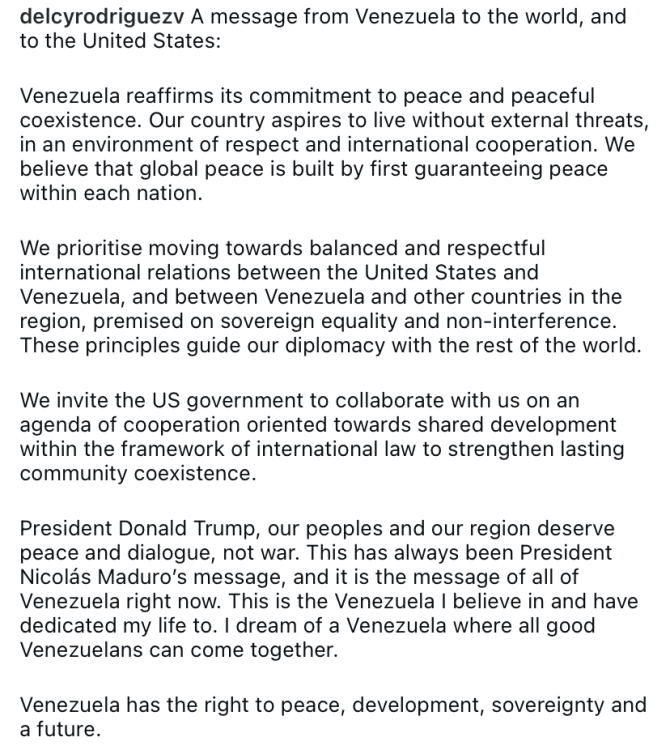
Everything posted by 956 Worldwide
-
Things not going well in Venezuela
Nothing says “avatar of the will of the people” like your entire palace guard consisting of foreigners.
-
Things not going well in Venezuela
@wildcat09 An anecdote from Uzbekistan: An unnamed company had to rent warehouses to store its pallets of local cash because the government refused to let them convert it into hard currency and putting it into a local bank meant that you basically lost access without paying a bribe. Occasionally the government would offer to convert but only if they took a 20 percent haircut. The firm had all this money listed as profit on its balance sheets, and walking away would have caused issues with auditors so it chose to maintain a minimum local presence and continue trying to solve the issue. The government felt this was very clever and would tell them that the money belonged to Uzbekistan and shouldn’t leave. One can imagine what this did to the investment climate. He mentions that the government was happy to see their educated citizens leave. I mentioned it above. It is a classic feature of idiot third world socialism, as opposed to what the Russians and East Europeans did after a course correction and the Chinese after a longer one. Those regimes internalized that a functioning country, even one building socialism, needed an intelligentsia and competent technical, scientific, and administrative class. They used a range of coercive and persuasive methods to build and retain them. The Berlin Wall was meant to keep the intelligent and talented IN, not the capitalists out. Idiot third world socialism is cunning, not smart. It is true that an illiterate and impoverished populace is easier to cow and rule over; and the leaders have the mentality of a successful crime kingpin; not realizing that this criminal mentality cannot enrich itself forever in the absence of prosperous rule followers to prey on. There is also internalized the deep idiot third world socialist belief that anyone who has or creates an extra measure of anything: wealth, intelligence, talent— must have somehow attained it by dubious or criminal means since that is the way they look at the world. (See: Cambodia and executing all the literate). The Chinese and Russians would show off their talented and intelligent as proof of what socialism could create. The idiot third world socialist simply tears down or welcomes their flight so that the promised equality may come prevail.
-
What the fuck is wrong with you, Austin?
Simply putting criminals in jail is one of those “fix things” buttons and there is a huge and fairly well-funded machine dedicated to not doing that. They will look at you with a straight face and tell you “communities” are harmed by putting life long criminals in prison until they are too old to be a problem. They don’t say “town” “city” or even “precinct” because those terms are precise and must include the people whose cars and homes he burgled, but “community” is vague and can exclude the people he preys and include whoever might want him around. The truth is that you could raise three strikes to five or eight strikes and achieve a similar result and drop in crime; a tiny subset of people commit an overwhelming amount of all property and violent crimes but there will never be a satisfactory point where the activists will say “he’s no-good and should live in jail.” Its always gonna be “society’s” fault and thus society’s punishment is to be preyed on.
-
FCS Title Game - Illinois State/Montana State - 6:30 CT ESPN
FCS football is so awesome.
-
Things not going well in Venezuela
@InkaUtexas since you’ve been mentioning food. Thread of former Cargill exec experiences. Some of this reminds me of Uzbekistan back in the Karimov era.
-
Things going on in Cuba...
LOL, Cuba already has lots of low-paying hospitality jobs run by foreign operators, it’s just that now the Communist government officially pays even lower salaries with non-convertible peso and ration cards and keeps the hard currency for itself.
-
Things going on in Cuba...
- Things not going well in Venezuela
I am very much speculating based on prior admin behavior, but I’d look to the Ukraine reconstruction investment fund (the “minerals deal”) as a potential template and pot sweetener for Rodriguez to get in line and incentivize U.S. companies to get involved. They like to use development as a more direct foreign policy and trade instrument, and I’m sure folks at the DFC are drawing up ideas. Political risk insurance, loan guarantees, even direct equity investments. Seed capital means a lot when it’s U.S. government funding. With the way Venezuela’s infrastructure has crumbled, it’s a strong candidate for this type of intervention and the admin is not above leaning a bit on U.S. companies to play ball especially if we are offering political risk insurance. Watch the space. There are other DFC-like vehicles that can be used, too.- Stagg Bowl
There are no scholarships at DIII, so all the other stuff becomes a huge factor: if schools can put together financial aid in other ways, invest in facilities, etc. The powerhouses can also maintain huge rosters and with no scholarships at play— at that level you might as well just play at a place that’s really good. UMHB followed this model to become a Texas DIII powerhouse, the difference in support they extend to athletics is insane compared to competitors like TLU or Howard-Payne.- Things not going well in Venezuela
- Gumbo
You inspired me to do étouffée like this and it was great. I also blend most salsas except for pico de gallo, especially if it’s for tacos and not dipping.- Things not going well in Venezuela
Georgian-German is a high-performance model. Rewarding but unforgiving, tell him to drive hard, but don’t forget regular maintenance.- Shit I've Cooked Lately
- Things not going well in Venezuela
The neocon part was the democracy building and trying to make things better; not the military interventions for resources.- Things not going well in Venezuela
Pics not loading. Georgian food is incredible, it’s sort of a heartier, more soulful riff on Persian and Turkish cuisine with haram stuff like wine and pork. God tier cuisine.- Things not going well in Venezuela
This is extremely speculative history but I know that paella is a Valencian specialty and most conquistador types and adventurers were Extremaduran, Andalusian, Castilian, Basque, Galician, etc. Valencia was extremely tied to the Mediterranean world and connected to the Atlantic via West African slave trading.- Things not going well in Venezuela
Gotta confess my complete gap for Brazilian food aside from a couple steakhouses I went to when in wedding parties. It sounds awesome, like when I tell people that Georgian food is in a tier with Italian, French, Thai, etc.- Things not going well in Venezuela
Chinese propaganda continues to make America look super fucking badass.- Things not going well in Venezuela
I should also mention that a big reason idiot third world socialism always fails worse then even the USSR is because they do not have the Berlin Wall or effective exit controls like the USSR or China. Those are there for a reason, they accomplished a lot by making all the competent scientists, administrators, engineers, economists stay in the country and do things on pain of their families getting sent to the gulag. (Cuba tries to do this to an extent). Not possible when anyone with a bit of education just gets a condo in Miami.- Things not going well in Venezuela
Chavez definitely did idiot third-world socialism and fucked things up; Venezuela was pulling out of the collapse of oil in the 1980s but not fast enough. It was not just his political tendencies, nasty autocrats can make decent economic decisions at times but it’s harder. Bro basically speed-ran the Soviet Union but with less competence and no space program: spend like crazy propped up by high hydrocarbon prices, rack up stupid external debts, destroy all other sectors by confiscation and mismanagement, establish cult of personality, die and leave everything to semi-literate peasant successors to make worse. Maduro is spiritually Lukashenka.- Things not going well in Venezuela
She will be invited to watch Maduro led in chains behind Marcus Rubicus Venezuelas through the new DC arch and get the message.- Things not going well in Venezuela
- Things not going well in Venezuela
I learned in all of this that the Cubans provided Maduro’s crack security team. That combined with just elevating the deputy just adds to the whole “Rome trying to fix a wayward client kingdom without devoting a whole legion to it” vibes we are giving here. Sassanids (Chinese) in shambles, already scheming how to reassert themselves in Armenia.- Things not going well in Venezuela
I remember my first pupusas, gave me the sad.- Things not going well in Venezuela
All Latin American food outside of Mexico and some of the Caribbean islands is pretty mid. God gave Mexico maybe the greatest cuisine on the planet and then shrugged as he went south. A few real gems like some South American ceviches and southern cone wine and grilled meats but none of it is close to a good mole or jerk. - Things not going well in Venezuela
Football ...
Basketball ...
Baseball ...
Other Sports ...
Futbol ...
🤫995🤫 ...
Gambling ...
Movies & TV ...
Music ...
Hobbies ...
Lulz ...
Food & Travel
...
Daily Texan ...
Business & Markets ...
Cloak Room ...
Help ...
For Sale ...
Board Discussion ...
Advertise...
Tailgate Donations
Back to top











